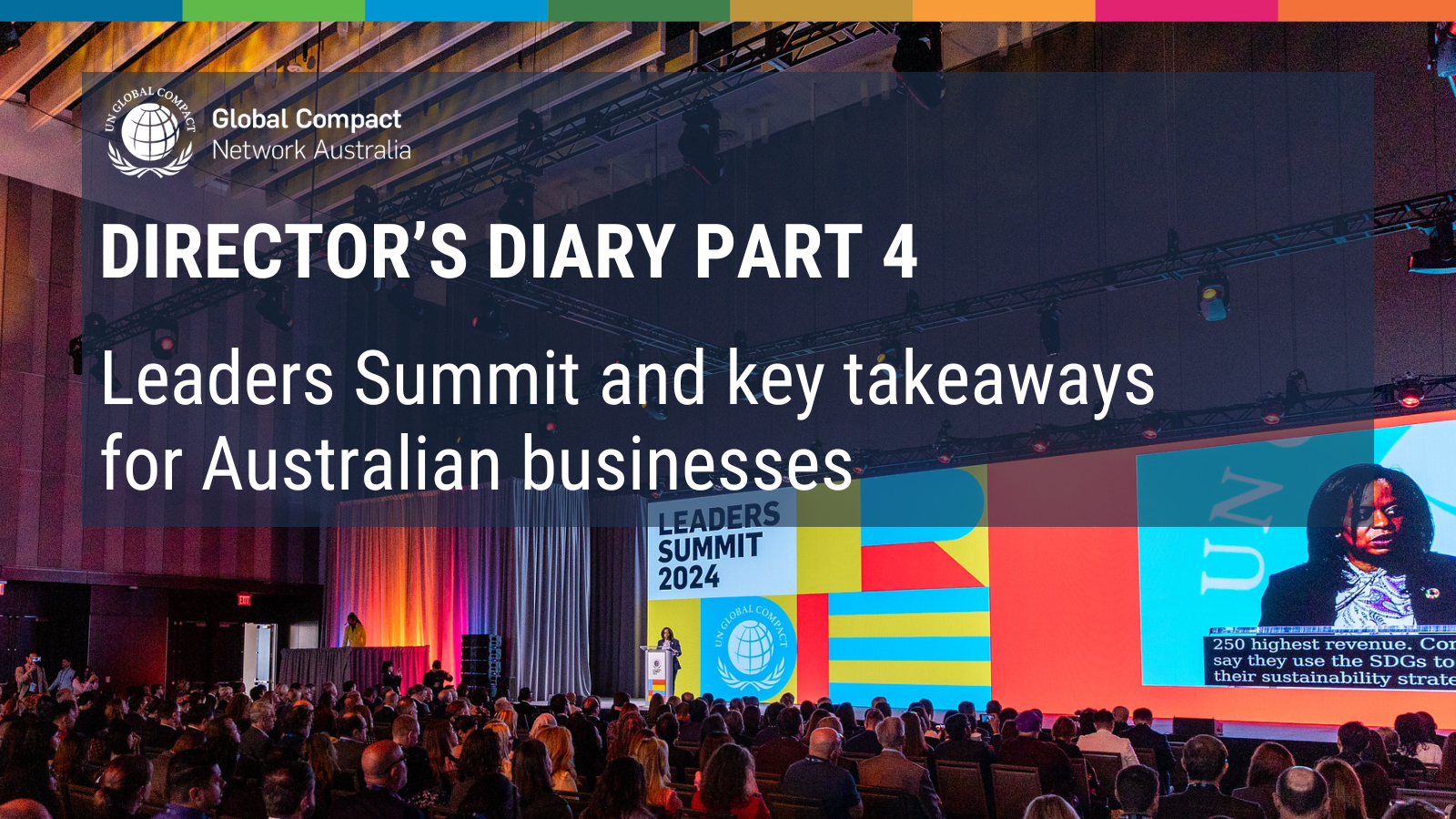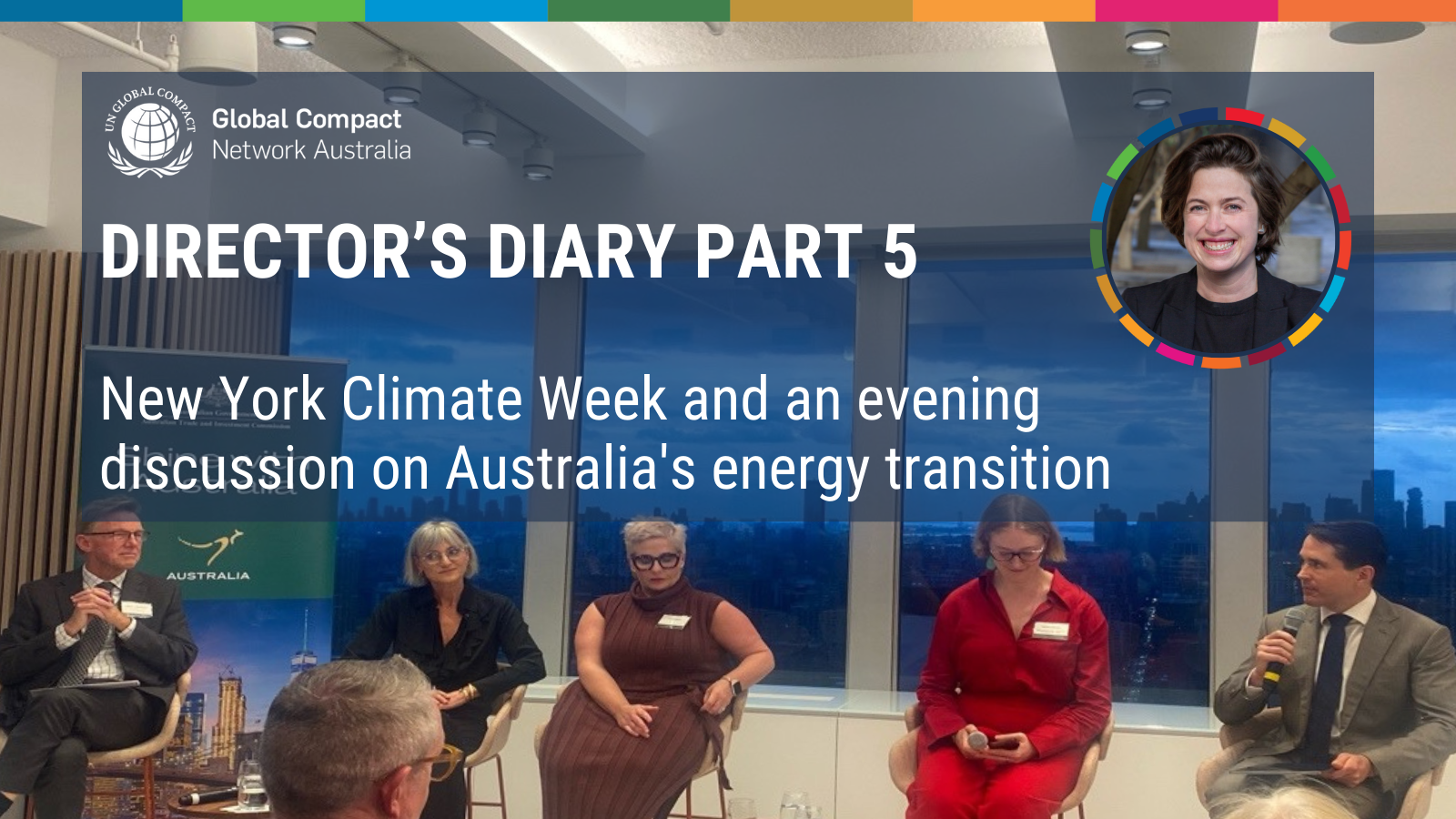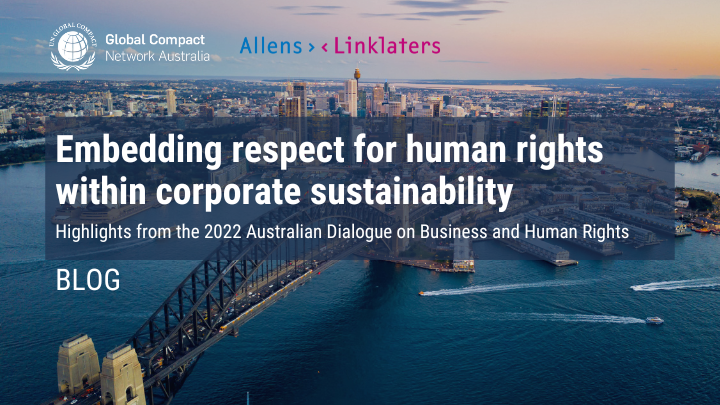
Blogs, Business & Human Rights, News
BLOG | Embedding respect for human rights within corporate sustainability: Highlights from the 2022 Australian Dialogue on Business and Human Rights
Chris Caskey | October 31, 2022
Key Points:
- In October 2022, the UN Global Compact Network Australia (UNGCNA) convened over 100 human rights practitioners, business and civil society leaders, investors, and government representatives to discuss how to integrate respect for human rights more effectively within Australian business.
- Attendees discussed the state of business and human rights within Australia and explored topics such as the evolving regulatory agenda, growing stakeholder expectations and the challenges posed by climate change on human rights.
- Panellists discussed key areas for improvement including assessing risks posed to people, integration with other business processes such as risk management, engagement with civil society, protection of human rights defenders and the establishment of inclusive and effective grievance mechanisms.
On 12 and 13 October, UN Global Compact Network Australia convened over 100 representatives from business, civil society, investor groups, government, and other stakeholders to discuss the integration of respect for human rights within corporate sustainability. Throughout the 1.5-day Dialogue, attendees discussed progress on integrating the UN Guiding Principles on Business and Human Rights (UNGPs) within Australia and explored shared challenges – such as the assessing and acting on risks to people and considering human rights within the decarbonisation process. The Dialogue was held under the Chatham House Rule. This summary provides our main insights from the Dialogue.
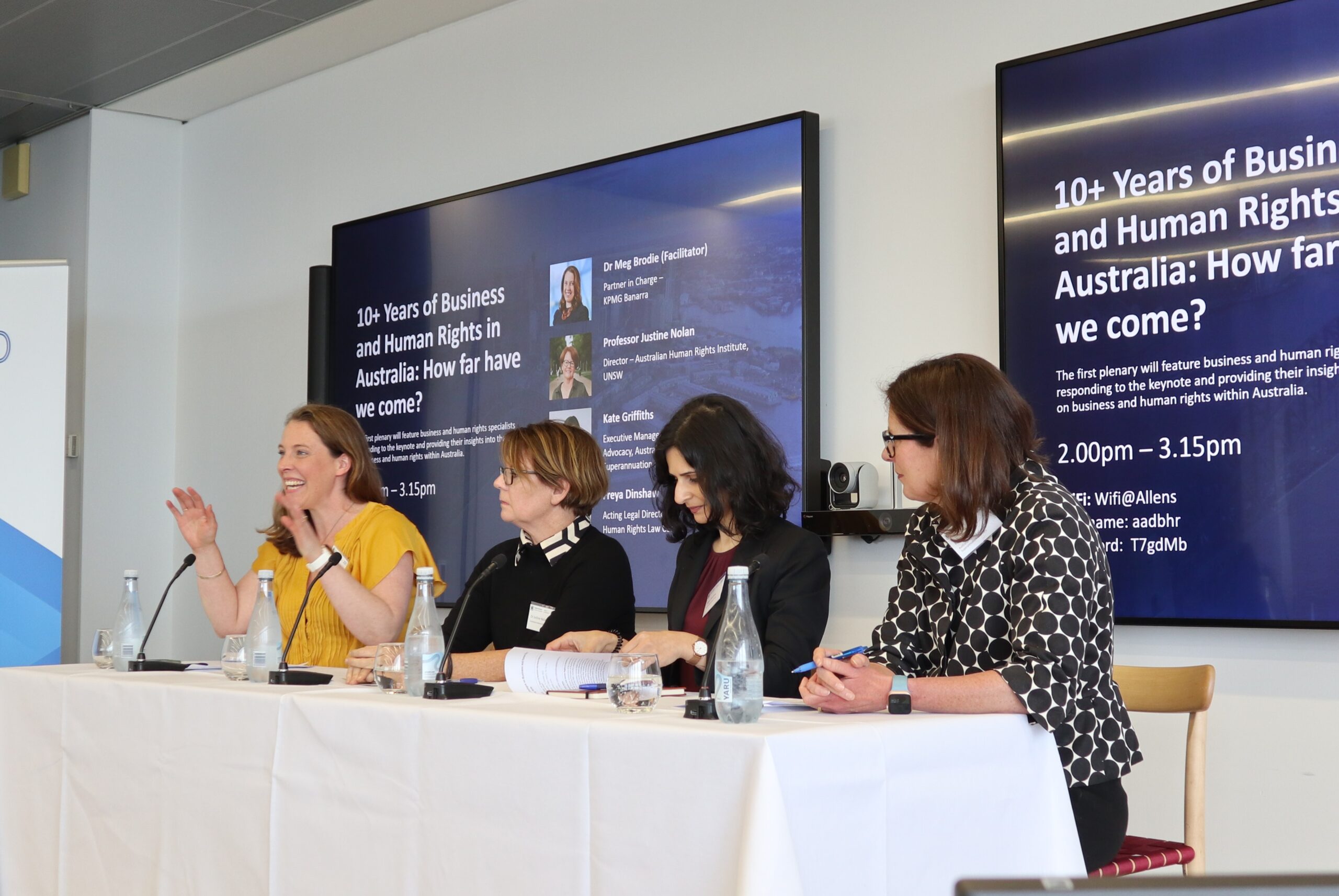
Dr Meg Brodie, Partner, KPMG Banarra (left), facilitates a panel at the 2022 Australian Dialogue on Business and Human Rights. Fellow panellists include Professor Justine Nolan, Freya Dinshaw and Kate Griffith.
- Australian businesses have made progress, but there’s a long way to go: Throughout the Dialogue, panellists observed that while the integration of respect for human rights by Australian business remains in an ‘implementation’ phase, the mainstreaming of ESG and regulatory requirements on modern slavery reporting had increased the focus on human rights. Panellists noted that the passing of the Australian Modern Slavery Act was a transformative moment that expanded business’ awareness of the ‘S’ in ESG beyond diversity and inclusion and has driven increased sophistication of due diligence and supplier engagement. However, panellists noted that access to an effective remedy remains the broadest implementation gap in Australia.
- Global human rights crises have implications for Australian businesses: Participants observed that ongoing human rights crises such as the war in Ukraine and military rule in Myanmar have increased geopolitical tensions. Within this environment, many businesses have been forced to reconsider certain business relationships, including where they are selling to, or sourcing from geographies experiencing human rights violations. Dialogue speakers reiterated the need to use the UNGPs as a guide, conduct “heightened” human rights due diligence and to refresh their assessment of impacts on human rights when making key business decisions. Importantly, businesses should also remain open to safeguarding and welcoming the views of human rights defenders and civil society more broadly, particularly where business decisions or activities introduce security or safety concerns.
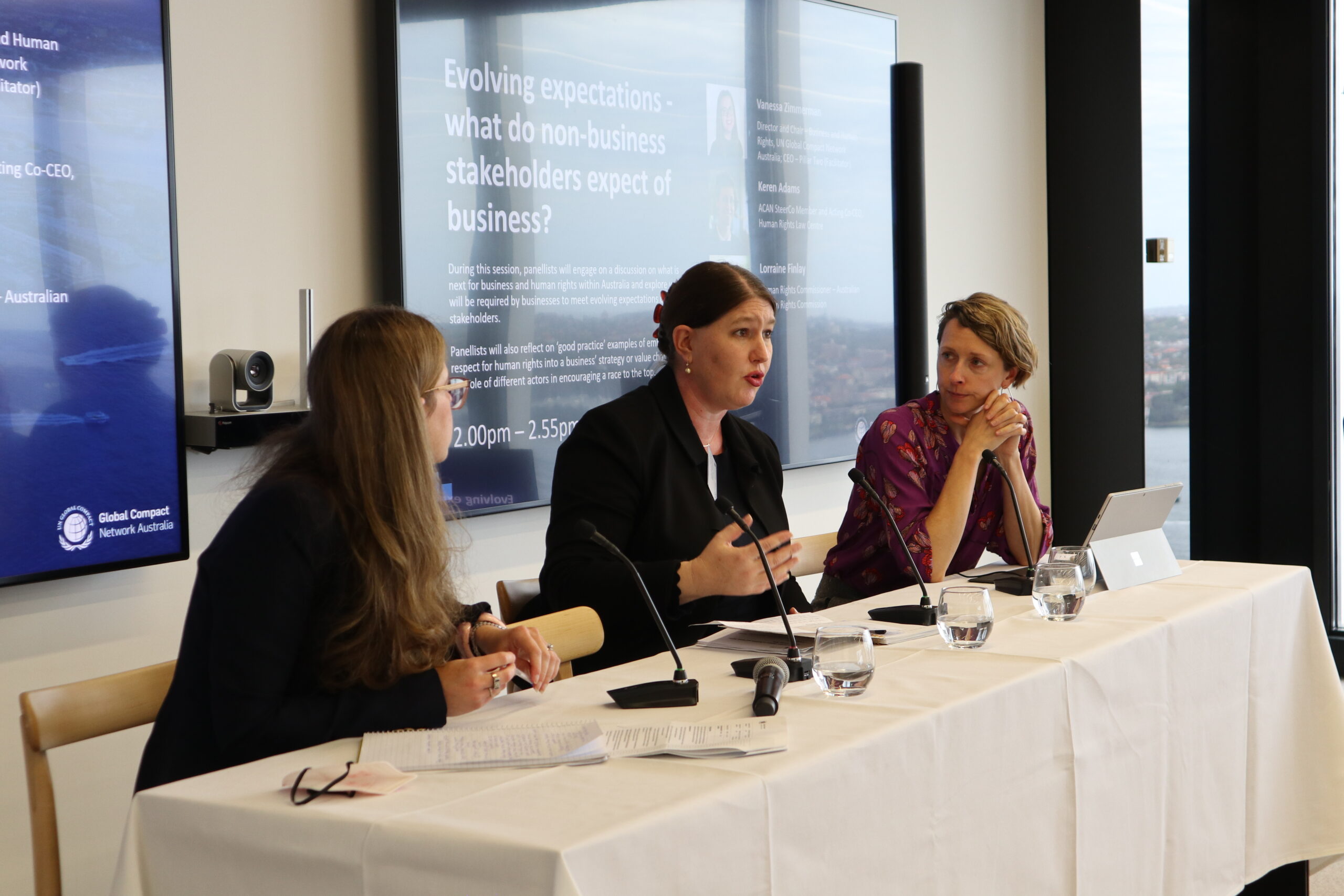
Human Rights Commissioner, Lorraine Finlay (centre), addresses the audience at the 2022 Australian Dialogue on Business and Human Rights. Ms Finlay is joined by Vanessa Zimmerman (facilitator, left) and Keren Adams (right).
- Civil society are not free consultants – and the union relationships is evolving: Panellists discussed the crucial role of civil society and human rights defenders in raising awareness of business involvement in potential human rights harm. However, some participants highlighted that civil society are often requested to participate in business’ materiality assessments and to provide informal ‘sense checks’ on certain issues. Attendees agreed that while civil society input is important, businesses looking for their input should remunerate them for the time and expertise. Panellists also discussed the role of unions in representing the worker voice, observing that the relationship with business had evolved significantly in recent years. Businesses are increasingly finding that unions can provide invaluable insights into the ‘worker voice’, presenting an opportunity to reframe the relationship with union bodies and renumerate representatives and workers for insights provided.
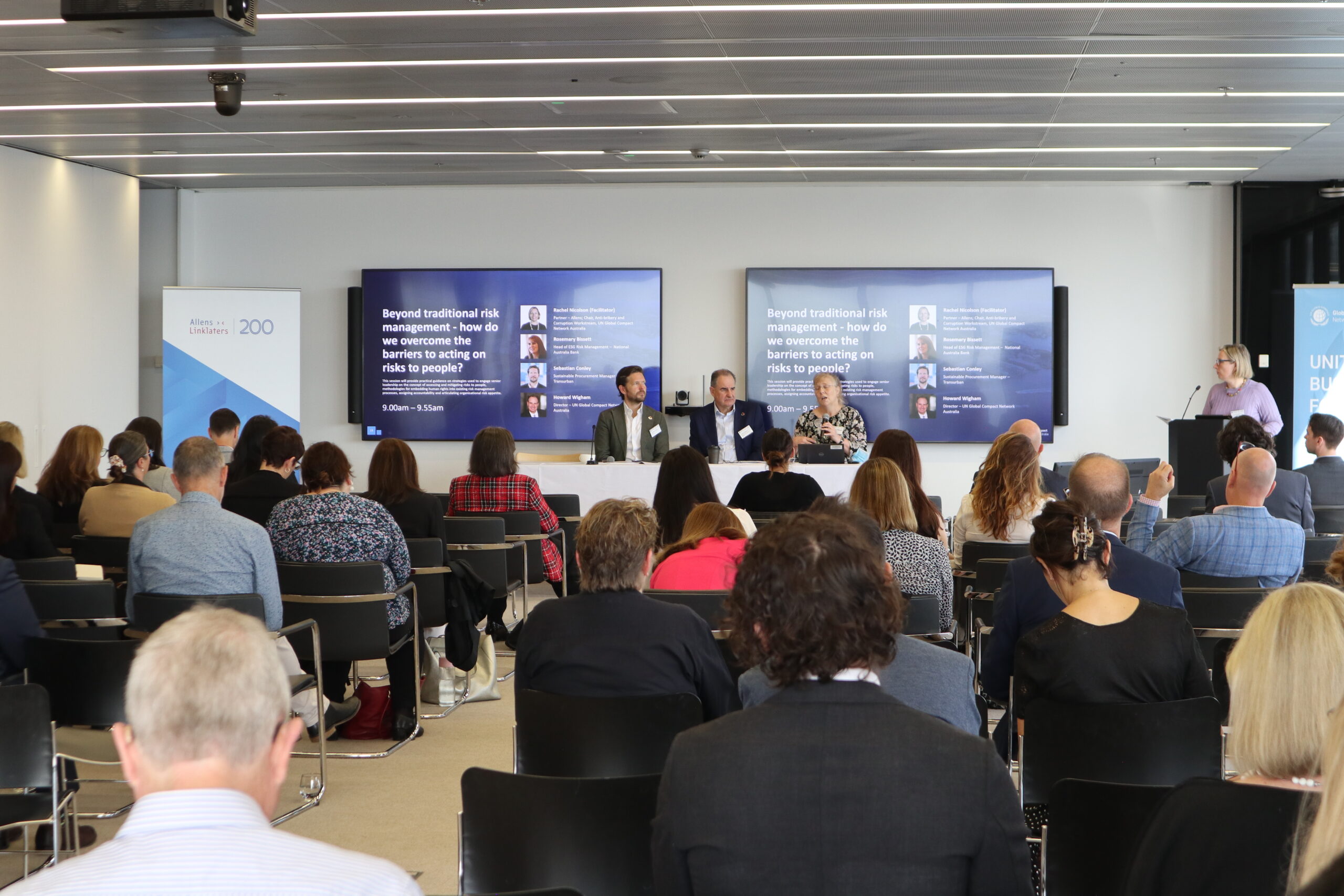
Rosemary Bissett, Head of ESG Risk Management at NAB, addresses the audience at the 2022 Australian Dialogue on Business and Human Rights. Ms Bissett is joined by Rachel Nicolson, facilitator (right), Howard Wigham and Sebastian Conley (co-panellists) (left).
- Integrating human rights within the business is an exercise in aligning priorities: When integrating a ‘risk-to-people’ assessment within business frameworks, practitioners highlighted the importance of taking a “pull, not push” approach, aligning with the priorities of internal stakeholders, and working within existing frameworks to drive internal change. This could include, for example, volunteering to provide insights on emerging human rights risks to governance or risk management teams while they are refreshing their own frameworks. Attendees also highlighted that focussing on salient human rights issues and tailoring the complexity of a human rights risk assessment to organisational maturity can significantly reduce internal friction. Attendees noted that integration into enterprise risk processes, such as risk appetite statements, impact assessments and governance and accountability frameworks is an achievable outcome, even if it does take time.
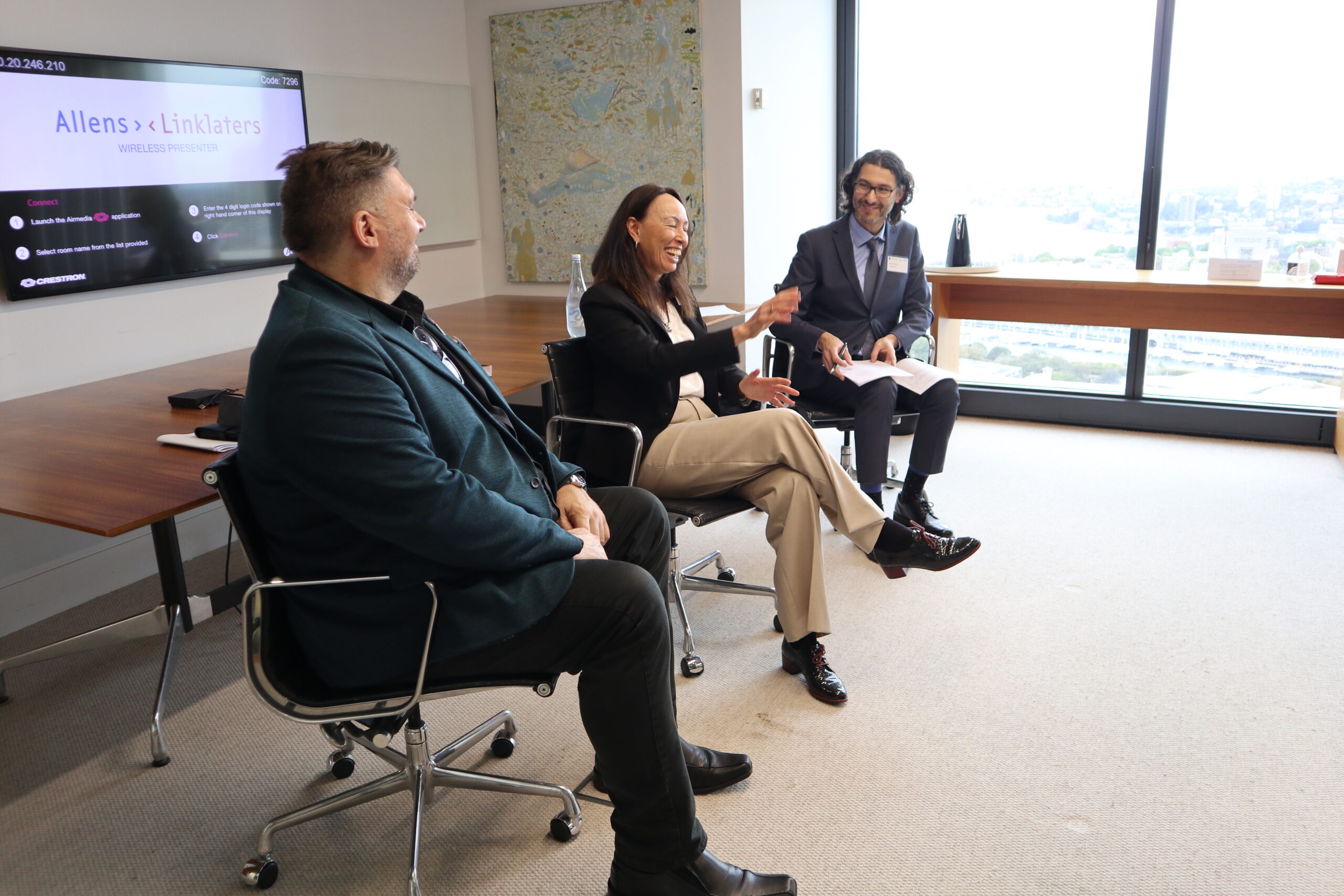
Leah Armstrong, Managing Director, First Australians Capital Limited, addresses the audience during a Breakout Room on enabling an Indigenous-led approach to environmental sustainability. Ms Armstrong is joined by Adam Lees (left) and Alan Dayeh (facilitator, right).
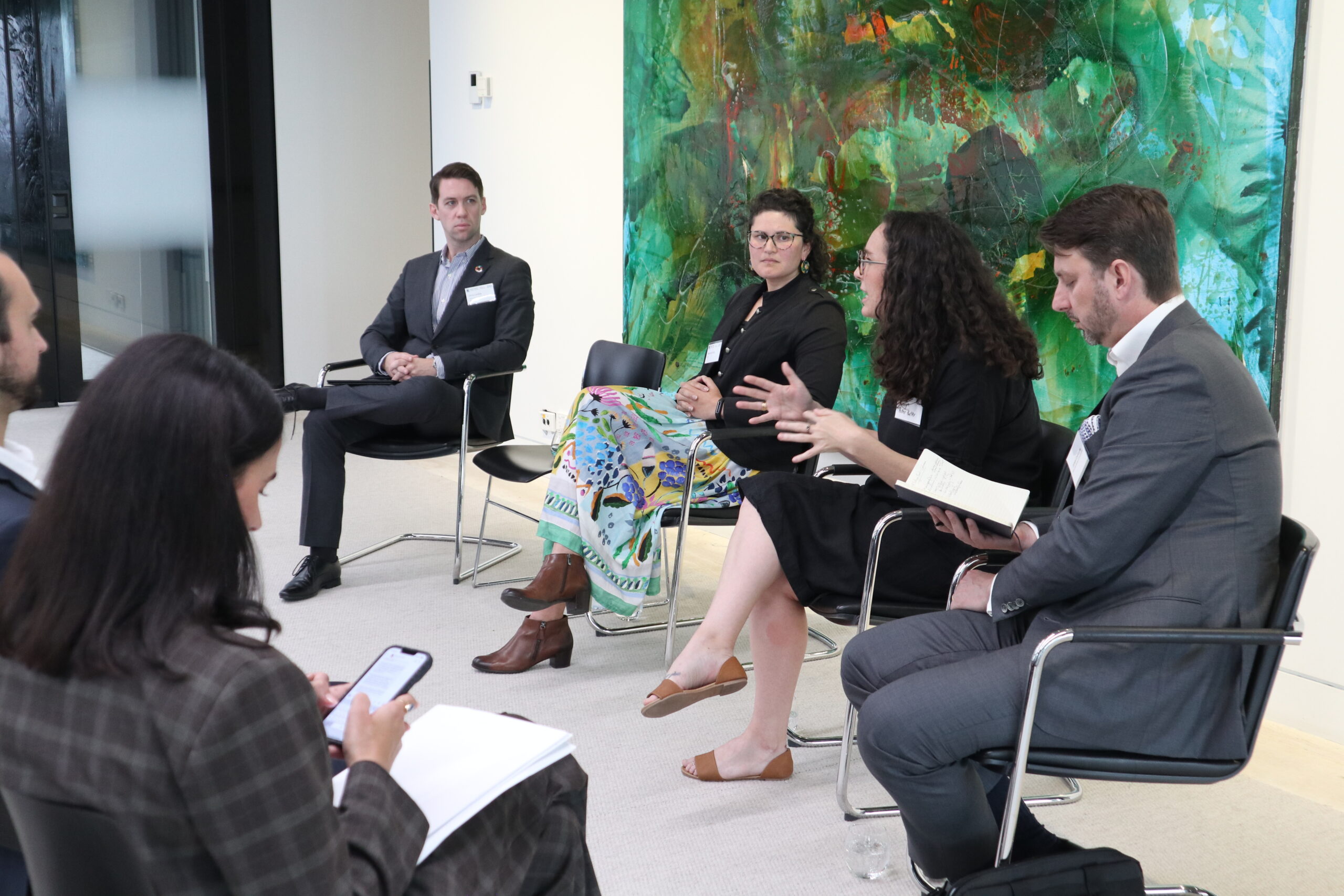
Georgia Potter Butler, National Co-ordinator of Property Services at United Workers Union addresses the audience during a Breakout Room on the continuum of labour exploitation and building effective worker engagement strategies. Ms Potter Butler is joined by Chris Caskey (facilitator, left), Poonam Datar (centre left), and Dr James Cockayne (right).
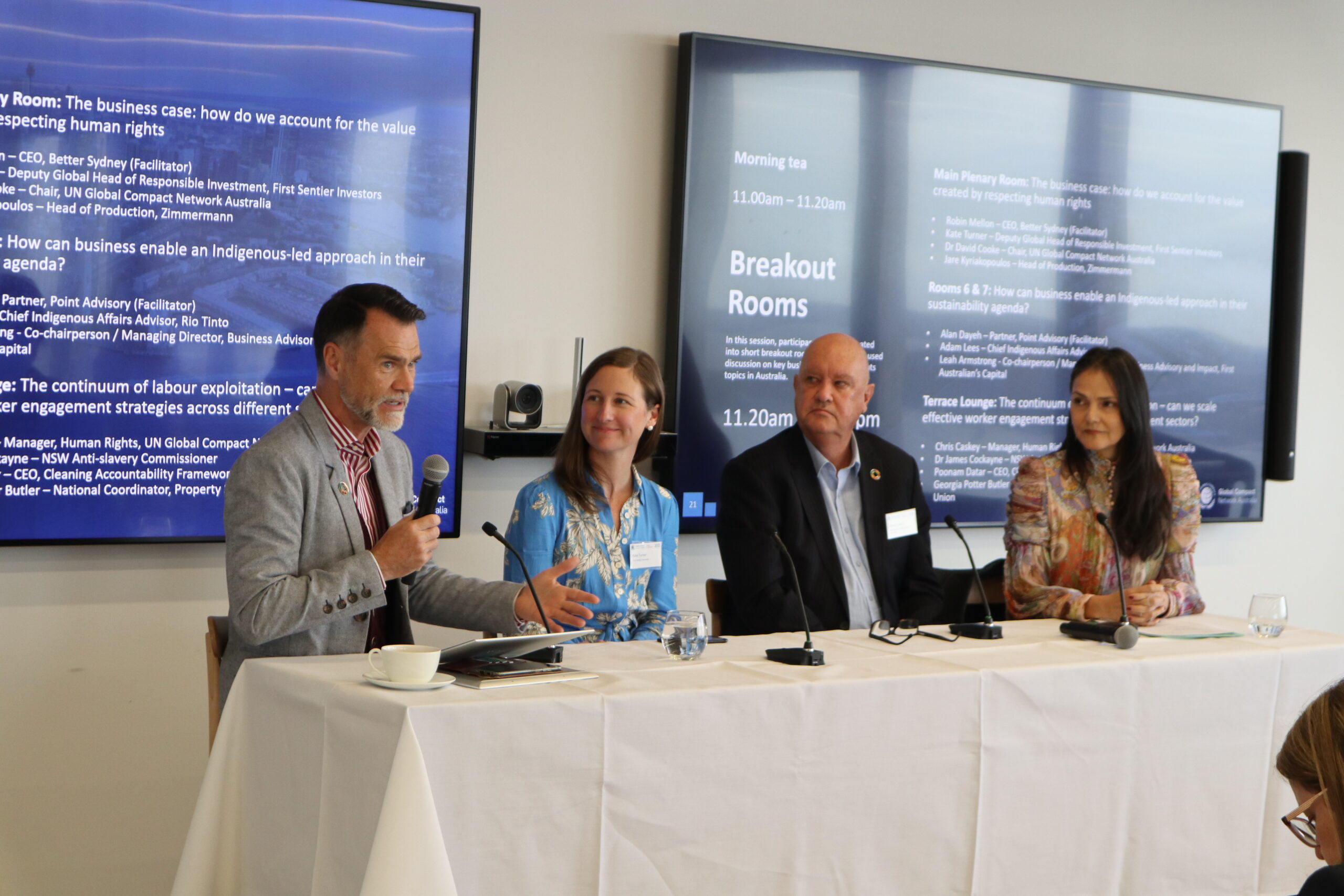
Robin Mellon, CEO, Better Sydney (facilitator) addresses the audience during a Breakout Room exploring the business case for respecting human rights. Mr Mellon is joined by Kate Turner (centre left), Dr David Cooke (centre right) and Jare Kyriakopoulos (right).
- The ‘how’ of integrating human rights and climate change is both complex and discrete for each organisation: While the UN has formally recognised the right to a safe, clean, healthy, and sustainable environment, taking meaningful steps to reduce emissions has been difficult for many businesses, especially those in hard-to-abate sectors. Some businesses that committed to the transition to Net Zero have identified a broad range of human rights impacts associated with the decarbonisation process, and attendees noted these can be categorised into physical and transition buckets, with each human rights impact requiring its own nuanced conversation, stakeholder engagement and remediation plan. Broadly, Dialogue panellists noted that these conflicting priorities often required difficult trade-off decisions to be made, but that work should begin immediately to reframe trade-offs as opportunities to improve outcomes for people.
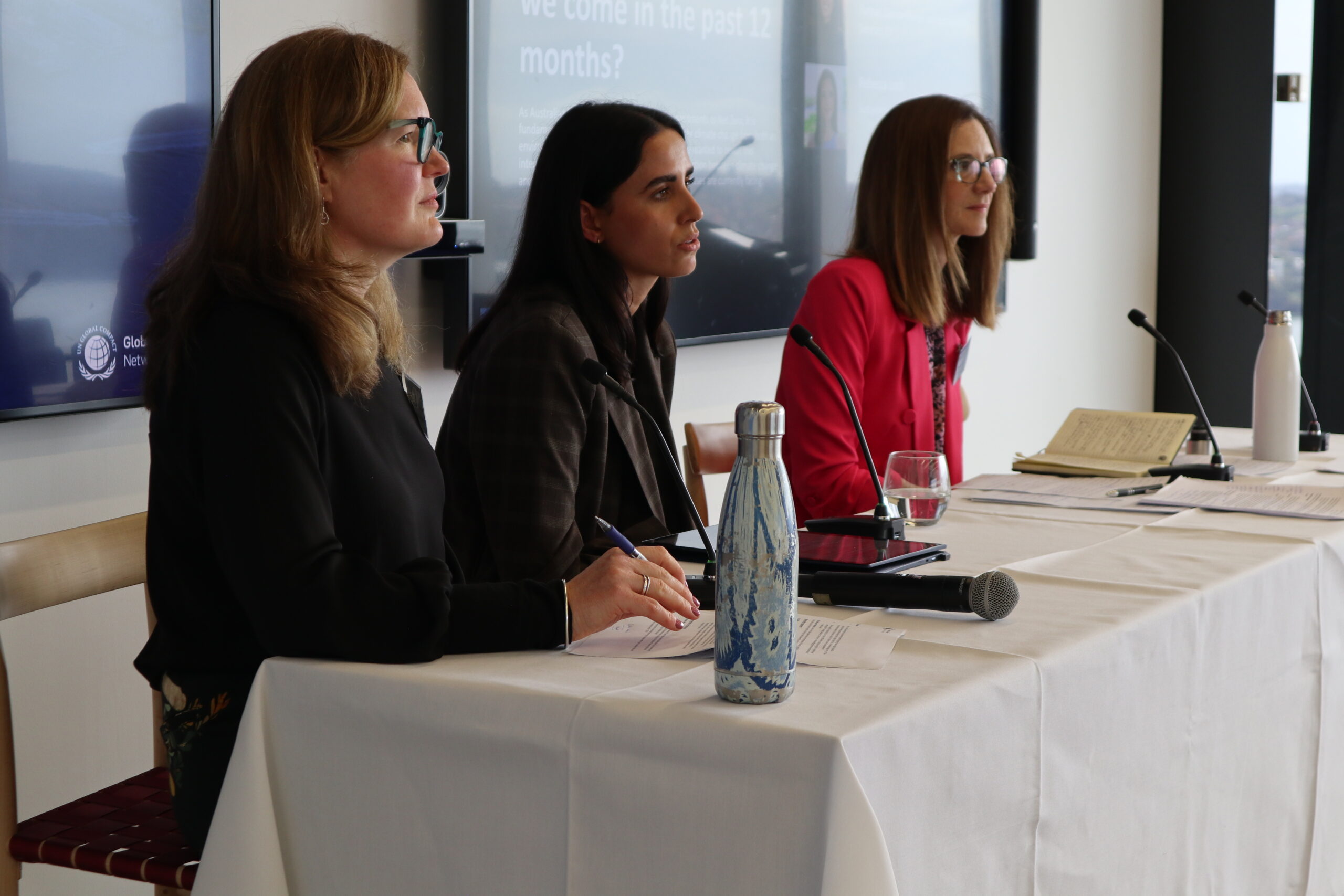
Alexandra Banks, Partner, EY addresses the audience during the 2022 Australian Dialogue on Business and Human Rights. Ms Banks is joined by Anna Stewart (facilitator, left), and Rebecca Loch (right).
- Access to remedy remains Australia’s largest business and human rights implementation gap: Panellists noted that while Australian businesses have made relatively comprehensive policy commitments and assessed their human rights impacts, the provision of effective remedy remains the largest UNGP implementation gap. Panellists noted that this likely due to several converging factors: including regulatory design, simplistic or ineffective grievance mechanism design and the power imbalance between business and human rights defenders. However, participants noted that the evolution of accountability processes, such as the Organisation for Economic Co-operation and Development (OCED) National Contact Point, is having a positive influence on business’ willingness to engage with human rights defenders. Broadly, panellists noted that companies should establish a listening mechanism that is sensitive to power imbalance, and that effective remedy must go beyond payouts and address the systemic environment which allowed adverse human rights impacts to occur. [1]
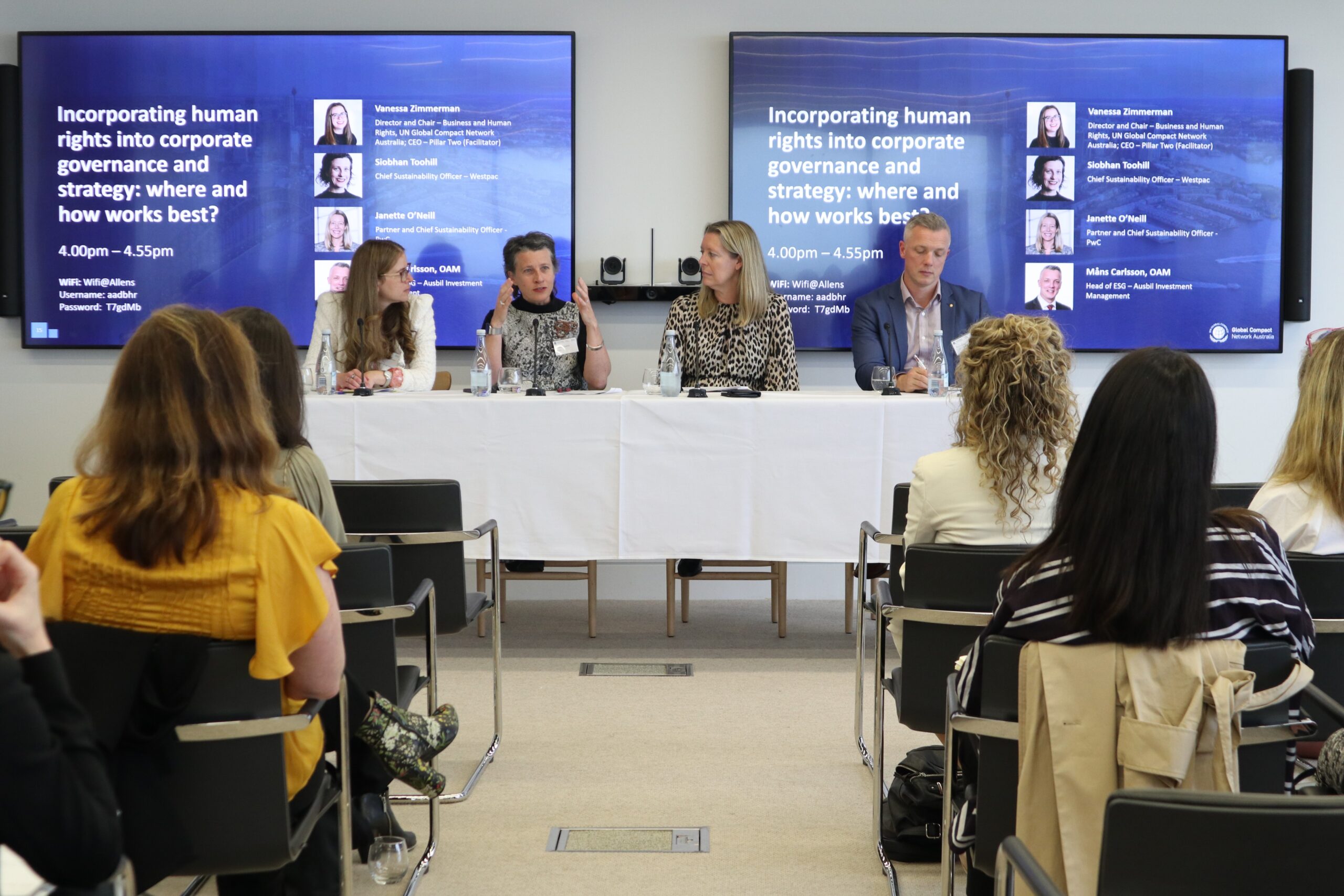
Siobhan Toohill, Chief Sustainability Officer, Westpac, addresses the audience at the 2022 Australian Dialogue on Business and Human Rights. Ms Toohill is joined by Vanessa Zimmerman (facilitator, left), Janette O’Neill (centre right) and Måns Carlsson, OAM (right).
- Respect is key to effective engagement – at all levels: In discussing the alignment between business, civil society and advocacy groups, panellists made the case that respecting the human goes beyond integrating the UNGPs. In trying to influence change within business, civil society and advocacy groups should look to leverage human rights practitioners within businesses as key stakeholders and partners, with adversarial engagement left as a last resort.
- Practitioners want the future to look fresh: Throughout the Dialogue, panellists reiterated the call for senior leaders to empower younger staff members to raise their voices, and that incorporating diversity of viewpoints into corporate decision making should be a goal of every business.
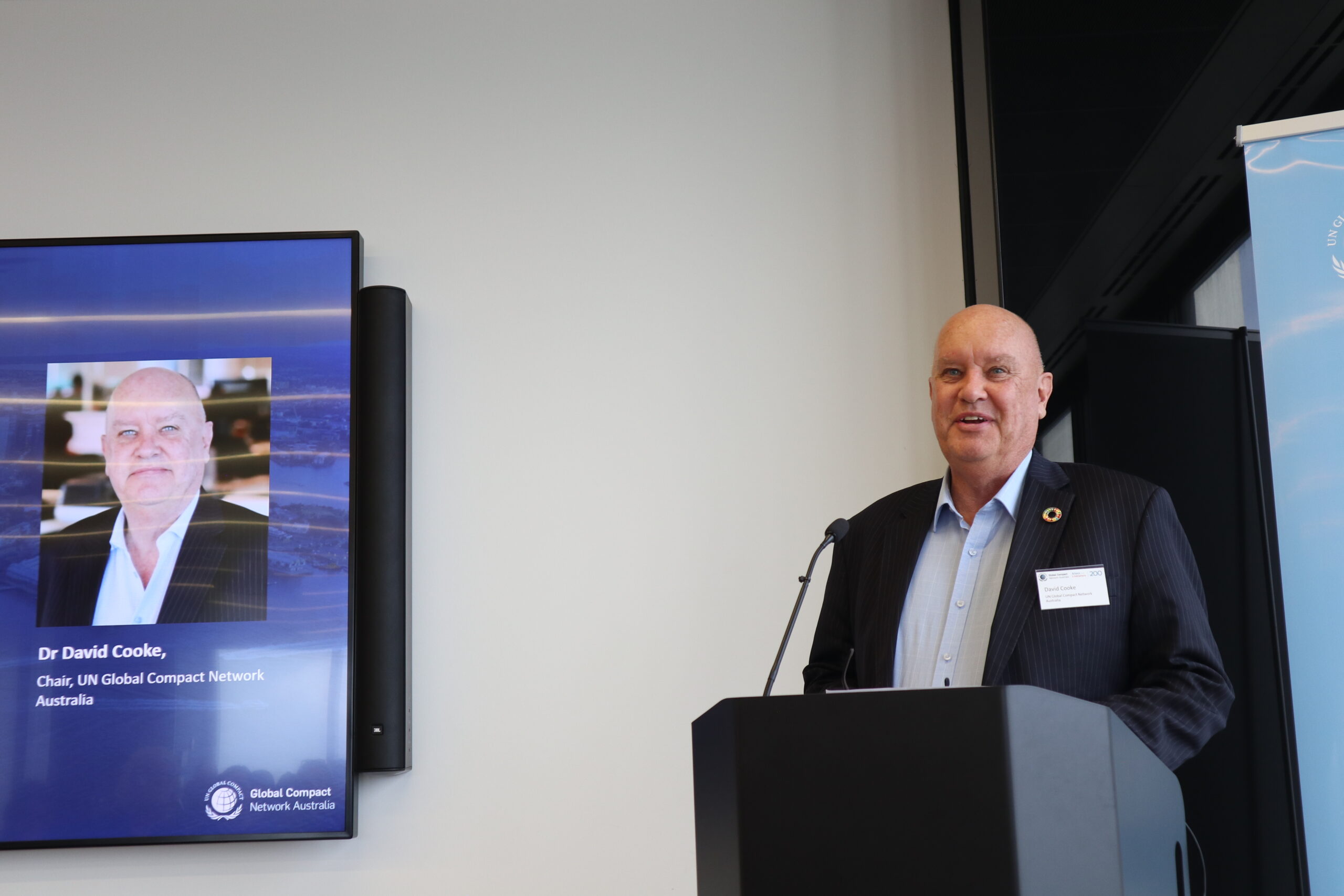
Dr David Cooke, Chair, UN Global Compact Network Australia, provides closing remarks at the 2022 Australian Dialogue on Business and Human Rights.
Building on momentum – next steps
To assist with the integration of the UNGPs in Australia, the UNGCNA formally launched the 2023 Business & Human Rights Accelerator program. The program will take Australian UN Global Compact participants through the establishment of a human rights due diligence process, and provide access to experts, training, and peer learning opportunities. The Accelerator runs from February 2023 to June 2023.
The UNGCNA is proud to deliver our annual multi-sector and multi-stakeholder forum dedicated to advancing the business and human rights agenda in Australia. We would like to extend our thanks to all speakers and attendees for sharing their perspectives with openness and honesty. The 2022 Dialogue was made possible by the kind support of Allens and Pillar Two.
[1] UN Global Compact Network Australia (UNGCNA) (2021) Implementing Effective Modern Slavery Grievance Mechanisms: A Guidance Note for Business. Available at: https://unglobalcompact.org.au/publications/



